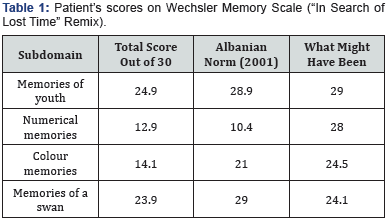Protozoal Importunity in a Thirty-Three-Year-Old Lawyer: A Farewell to Arms?
Joseph Miller*
University of the Third Degree, UK
Submission: May 07, 2018;Published: June 25, 2018
*Corresponding author: Joseph Miller, Doctor, University of The Third Degree, 139 S Rock Rd, Woodend VIC 3442, Tel: +61-2 9437 9200; E-mail: millerjoe1988@gmail.com
How to cite this article: Joseph Miller. Protozoal Importunity in a Thirty-Three-Year-Old Lawyer: A Farewell to Arms?. Glob J Reprod Med. 2018; 5(1): 555652. DOI:10.19080/GJORM.2018.05.555652.
Abstract
Protozoal Importunity (PI) is an unflattering diagnosis, from which patients often and nevertheless interminably. We present the case of a fifty-three-year-old Albanian man, who presented with a thirty-three-year-old laywer (Ms H), who presented with PI. This was in the month of June, at the Royal Kongwak Hospital.
Keywords: Protozoal importunity; Calcium carbonate; Iron; Niacin; Thiamin; Protozoan inertia;Anterior pituitary; Memory; Codeine; Renal divination; Microbial exploration; Memory loss; Diminution; Bladder; Somato sensory system; Kidneys; Kinetic lexicon; Land grab; Pancreas; Echinacea; Sella turcica;Perambulation; Belligerent
Case Report
Protozoal importunity
In 1982, Versace & Hawksbreath [1] reported a case of PI in a small mining community in West Ealing, where the local population had been exposed to ‘heroic’ doses of Calcium Carbonate, Iron, Niacin and Thiamin. Thiamin is known to exaggerate the speed of the protozoa without affecting its colour; Calcium is known to do the opposite. The result is a sort of inertia, termed ‘Protozoan Inertia’, which often leads to eukaryotic ennui. Thence, the only relief can come from the anterior pituitary. The protozoa begs the anterior pituitary to keep it distracted; if the anterior pituitary agrees, this will come at a severe cost to the patient. That cost is memory.
Quite the conundrum
As the week progressed, it became more and more apparent that Ms H could remember nothing of what was about to happen. We took her to a smaller hospital in a large van (white, 876kg, Mercedes) and administered codeine (white, 40mg, Sandoz). Renal divination supported psychological assessment followed by microbial exploration.
Memory weakening
PI can often lead to weakening of the memory. To assess memory loss, we served the patient a collection of working memory tests from the Wechsler Adult Inquisition Slather VI (WAIS-VI; see tables 1-2).


A Deadly tango
By Sunday, we noticed a diminution in Ms H’s capacity to walk backwards (acute perpatistosis). Experts were called in, and upon reducing laboratory brightness by 15.3, we introduced a dozen eggs to a large dish. After breakfast, the experts had Ms H look at a wall. Parts of the wall were then analysed through an electron microscope. It was as they had suspected; the protozoa and the anterior pituitary had formed a death pact (pacto de muerte), and were conspiring to assassinate the bladder. Informed of their intentions by the somatosensory system, the bladder formed an alliance with the kidneys, relaying messages back and forth in an encrypted kinetic lexicon indistinguishable from the heartbeat. Espying the opportunity for what endocrinologists call a ‘land grab’, the pancreas attempted to annex the entire lower half of the body. The anterior pituitary realised that it had grossly misapprehended the situation; it fled to the uterus, leaving the protozoa outflanked on two sides. The pancreas’ recriminations were swift and merciless.
As the battle wore on, we decided to bribe the pancreas and the kidneys into a settlement, using a mixture of Potassium and Echinacea. Moved by the Echinacea, the pancreas conceded to terms of peace, as a result of which the kidneys receded to the abdominal cavity, and the anterior pituitary skulked back to the sella turcica. By nine pm, Ms H was medically normal, capable of backwards perambulation and Djibouti-remembering.
Conclusion
What eventuated was medically, if not historically, unprecedented. PI is an extremely rare condition, and is unlikely to manifest twice in the same continent [2]. However, this case study suggests the efficacy of Echinacea as a bribing agent, should the organs become belligerent.






























